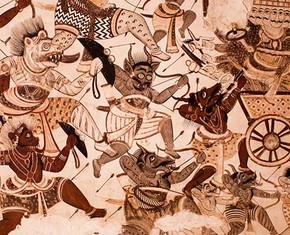The views expressed in our content reflect individual perspectives and do not represent the authoritative views of the Baha'i Faith.
As the oldest child in a family of five children, I saw four babies come along after me, and in fairly rapid succession. You know how it is—new babies tend to get a lot of attention, and the older children have to deal with that parental shift in priorities. I suppose this must have made me a little nervous, because I remember asking my mother, when I was about four years old and after yet another new sibling arrived, “Mom, which one of us do you love most?”
Surprised, she looked at me and said, like all good parents do, “I love you all exactly the same!”
Do you think God feels that way? Does God love everyone in the human family equally?
I asked that question when I first began searching for a spiritual path; and after I first discovered the Baha’i Faith I asked it, too. Everyone asks that question, I suppose—when misfortune or trouble occurs, we all ask it. Does God love us?
For me, one sentence in the Baha’i writings finally and conclusively answers that question:
The guiding principles of the Baha’is are: honesty, love, charity and trustworthiness; the setting of the common good above private interest; and the practice of godliness, virtue and moderation. – Shoghi Effendi, from a letter to a National Spiritual Assembly, 18 December 1925.
This single sentence, from the Guardian of the Baha’i Faith, nicely summarizes the essence of religion and the essential Baha’i life—and answers the old question about which of us God loves most.
Let’s deconstruct the sentence—it lists four deep inner character attributes, three spiritual practices and one overriding collective philosophy, “the setting of the common good above private interest.”
If God loves all humanity equally, wouldn’t it stand to reason that the Creator’s religious teachings would emphasize the common good above any one person’s private interest?
In the Bible, when Christ’s apostle Peter met the centurion Cornelius, a gentile, Peter explained what God had revealed to him:
Of a truth I perceive that God is no respecter of persons: but in every nation he that feareth him, and worketh righteousness, is accepted with him. – Acts 10:34-35.
At the time, Peter’s fellow Jews tended to think that God loved them more than the gentiles—that they were “God’s chosen people.” But Christ had taught Peter that God does not show favoritism, or exalt one person or group above another. God, in other words, loves people from all faiths and all nations and all backgrounds. No religion is privileged over another. No race is privileged over another. No class is privileged over another. No gender is privileged over another. There are no “chosen people”—all of us are chosen.
Triumphalism—the idea that one set of beliefs trumps or outranks all others—has no place in the Baha’i teachings. Baha’is believe that all people are one, and that each of us receives an equal share of love from our Father, God:
God is not partial and is no respecter of persons. He has made provision for all. The harvest comes forth for everyone. The rain showers upon everybody and the heat of the sun is destined to warm everyone. The verdure of the earth is for everyone. Therefore there should be for all humanity the utmost happiness, the utmost comfort, the utmost well-being. – Abdu’l-Baha, Foundations of World Unity, p. 41.
This perennial philosophy—that the common good prevails over private interest in the eyes of God—resonates throughout every true Faith. It underpins the Golden Rule, supports the universal law of love and holds up the highest human qualities of altruism and service to others:
Sincerity is the foundation-stone of faith. That is, a religious individual must disregard his personal desires and seek in whatever way he can wholeheartedly to serve the public interest; and it is impossible for a human being to turn aside from his own selfish advantages and sacrifice his own good for the good of the community except through true religious faith. For self-love is kneaded into the very clay of man, and it is not possible that, without any hope of a substantial reward, he should neglect his own present material good. That individual, however, who puts his faith in God and believes in the words of God — because he is promised and certain of a plentiful reward in the next life, and because worldly benefits as compared to the abiding joy and glory of future planes of existence are nothing to him — will for the sake of God abandon his own peace and profit and will freely consecrate his heart and soul to the common good. – Abdu’l-Baha, The Secret of Divine Civilization, pp. 96-97.
That deep consciousness of the common good, and the primary Baha’i principle of the oneness of humanity, is the foundation of the Faith of God in this age.
















Comments
Sign in or create an account
Continue with Googleor